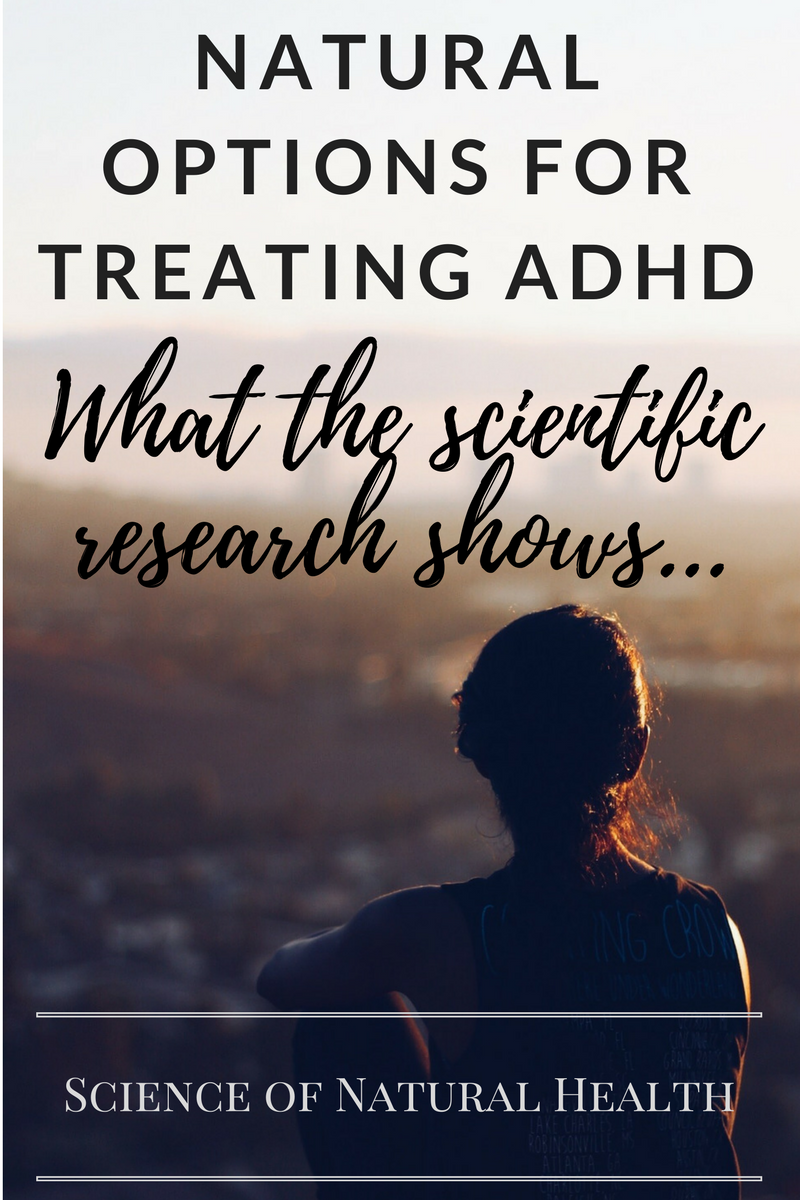Natural Options for Treating ADHD
Natural Options for ADHD:
A Review of the Research on Natural Supplements
and Alternative Treatments for ADHD
It’s not really news that attention deficit/hyperactivity disorder (ADHD) is currently the most common diagnosis among youth in the United States.
And you probably already know that typically, ADHD is treated with behavioral/psychosocial management and/or medicines.
The more interesting news is that as a result, natural treatment options for attention deficit/hyperactivity disorder are becoming increasingly popular as sufferers look for options that are effective and that have fewer side-effects. It’s estimated that approximately 50% of parents of children with ADHD use “natural” options alone, or in conjunction with traditional therapies.
A recent review of the biomedical research on naturally managing ADHD – published in the February 2016 issue of the journal Neural Plasticity – suggests that there are a few options for naturally treating ADHD that individuals can discuss with their health care providers.
I was inspired to take-on this article by a friend who struggles with a child diagnosed with ADHD. It is a tough road for the children and caregivers who are navigating ADHD, with few effective options, and of those, even fewer are appealing. Managing ADHD is a challenging, heart-wrenching, frustrating and serious mission for these parents.
Often, this condition is diagnosed in childhood, and persists into adulthood, therefore requiring long-term treatments. Many families managing attention deficit/hyperactivity disorder are dissatisfied with how well the current treatments work, or with the side-effects of prescribed medications in both the short-term and long-term.
Here I will summarize just a few of the most common, and the most promising natural options for ADHD that you may, or may not have heard of. There are many, many options that have potential, and so, this article is Part I, of what may be a very long-running research topic…
Pycnogenol® (French Maritime Pine Bark Extract)
In studies using pycnogenol for ADHD treatment, significant improvements were found in both behavioral measures – hyperactivity, inattentiveness, and visual-motor coordination improved – as well as physiological measures – oxidative DNA damage, cerebral blood flow, urinary concentrations of catecholamines – and antioxidant homeostasis improved. The reported side effects were mild, such as gastric discomfort.
But here’s the kicker, neither pycnogenol, nor the gold-standard for ADHD treatement – methylphenidate, otherwise known as Ritalin – improved symptoms more than the placebo.
I want to say that again so it really sinks in. I’ll use the exact words of the authors James Ahn, and colleagues:
”Of note, neither Pycnogenol nor the positive control, methylphenidate, outperformed placebo on any ADHD rating scale.”
Yes. You read that correctly. You can get the same outcomes of Ritalin or pycnogenol (or maybe even better outcomes) with a placebo.
This seems like a good time to review the potential side effects of Ritalin (methylphenidate):
First, Ritalin is a stimulant in the amphetamine family with the same potential for abuse as amphetamines. In fact, the government classifies it as a Schedule II substance (like cocaine and morphine), meaning that it has a high potential for abuse and may lead to physical and or psychological dependency. A limit is set on how much of this narcotic can be manufactured each year. The most “serious” label that can be required by the FDA (the “black box disclosure”) is required, alerting consumers to this real risk.
Here is the laundry list of potential side effects with the most common ones listed first:
- Addiction
- Nervousness including agitation, anxiety and irritability
- Trouble sleeping (insomnia)
- Decreased appetite
- Headache
- Stomach ache
- Nausea
- Dizziness
- Heart palpitations
- Slowing of growth (height and weight) in children
- Seizures, mainly in patients with a history of seizures
- Eyesight changes or blurred vision
- High blood pressure
- Rapid pulse rate (and other heart problems)
- Tolerance (constant need to raise the dose)
- Feelings of suspicion and paranoia
- Visual hallucinations (seeing things that are not there)
- Depression
- Cocaine craving
- Dermatoses (infected or diseased skin)
- Urinary tract infection
- Infection or viral infection
- Elevated ALT enzyme levels in the blood (signaling liver damage)

Really, I could write a whole separate article about what the research is revealing about Ritalin from erectile dysfunction to disruption of brain cell development. Maybe I will. Another day. For now, I digress…
The point is, according to the above study, you could just use a placebo as an alternative to Ritalin, with presumably no side effects because it is designed to be completely inert, and that will match or outperform methylphenidate to relieve ADHD symptoms.
Something to think about.
St. John’s Wort
While St. John’s Wort is one of the most highly recognized herbs for mental conditions, stringent trials for its use to treat ADHD have come up short. It is possible that those individuals who also experience conditions for which St. John’s Wort is well-known, like depression, obsessive-compulsive disorders, somatization disorder or social phobia, in addition to ADHD will get some relief with this herb. However, it does not look too promising specifically for attention deficit/hyperactivity disorder.
Panax Ginseng (Korean Red Ginseng)
When children diagnosed with ADHD aged 6-14 were given ginseng for eight weeks, in two different studies, they showed improvements in ADHD symptoms compared to control subjects who did not take the herb. Although the studies were small, and they did not compare results with standard prescription medications, the improvements seen were promising. Improved attention, decreased inattention/hyperactivity scores, and even normalized brain activity recordings were statistically significant in the studies. The side-effects of ginseng included headaches, fatigue, perspiration, and aversion to the taste. It is believed that ginseng may work through the dopamine and norepinephrine pathways and/or via its antioxidant effects.
Ginko biloba
Ginko biloba is already known for its use in treating dementia, and researchers know that it acts on neurotransmitter systems, and blood flow to the brain, making it a good potential ADHD alternative treatment. In biomedical studies, the results are mixed. That is, studies show a significant improvement in subjects’ ADHD symptoms with both ginko alone and in combination with ginseng. In fact, there was significant improvement in hyperactivity, cognitive problems and oppositional behavior in 50% of children receiving both ginko and ginseng up to 4 weeks after treatment. However, a separate study comparing ginko to methylphenidate found that ginko was inferior to the prescription drug when evaluating the endpoint of treatment. It was reported that subjects taking ginko also suffered from side effects that made them more impulsive, hyperactive, aggressive, emotional and sweaty. As a result, it is unclear whether ginko is a good alternative treatment option for all ADHD cases.
Given the general dissatisfaction with methylphenidate and its potential side effects, it is promising to see research that points to other potential natural, and alternative treatment options for ADHD.
Regardless of what approach you choose to manage ADHD, remember to consult with a qualified health care provider. This article is intended to share the science of natural health and some of the research available on potential alternative options, and should be used for informational purposes only; it is not intended to diagnose, treat, prevent, or cure any disease.
How about you? Are you one of the 50% of families who manage ADHD with alternative and natural treatments? What are your challenges, and what are your successes? Join the conversation below…
REFERENCES:
James Ahn, et al. “Natural Plant-Derived Treatments for Attention-Deficit/Hyperactivity Disorder: Safety, Efficacy, and Therapeutic Potential for Combination Therapy.” Neural Plasticity 2016.
This article was first published at ZaraPhD.com, and has been reprinted here with permission from the author.
Note: This page may contain
affiliate links. You get the great product that I would recommend
anyway at the normal price, and I get a few pennies to to support my
love for Sharing the Science. You can check out my Privacy Policy, too.
I'm Zara, PhD
Hello. I'm a neurobiologist turned mother and business owner, sharing the science of natural health and putting it into practice. More...




New! Leave a Comment